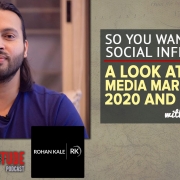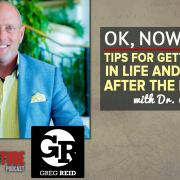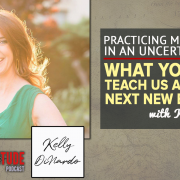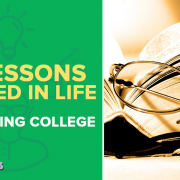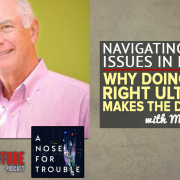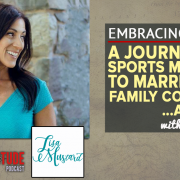It’s funny, but sometimes I hear myself in the podcast saying phrases like “back in college…” or “back in grad school…” like it was the height of my education. I play it as if I haven’t learned much since then. But, when I think about it, I wouldn’t trade the experiences and knowledge I’ve gained since then for anything. When it comes to lessons learned in life, there’s a few things I can think of.
If anything, I’ve picked up quite a bit more wisdom in the last ten years. Much more than I had when I was “formally” trained. In this post, I’ll share some of the things I’ve learned along the way that might be impossible to learn in school.
College is Not For Everyone
When I was growing up, the expectation for me was that I would go to college. There wasn’t a question about it. Both of my parents had gone and, on top of that, they both had Masters degrees. So my bar was set. (Thankfully I’ve always loved learning and putting ideas together!)
Because of that, I figured that I might as well get a PhD and go the professor route. I saw what my mom was able to do during her summers as a teacher, so I thought if I put in a little bit more time that I’d be able to have an even longer summer!
Well, I get to grad school and that’s when my real education in life started. Not only did I learn that becoming a tenured professor is about as likely as getting struck by lightning, but there would be a lot of politics along the way. And, me being a staunch Republican at the time, I’d always be on the losing end of the battle.
At the same time, I was teaching an organizational leadership course six times a week to roughly 30 students in each class. While I was teaching the course, I started to realize that many students were checking out during class. And, while they might be present in that you could have a conversation with them, they didn’t seem to be involved in the class material.
They weren’t learning.
As a lifelong learner, I was naturally good at absorbing knowledge. So this was a little odd to me. The next course I ended up teaching was basically an Honors course, so I didn’t really have much of a repeating pattern.
Until I started teaching algebra at the junior college level.
Algebra…
And, wow… talk about people who wanted to be anywhere but in the classroom… most of those students were there to have better opportunities in their career. Not to learn algebra.
So I started wondering: how many classes are like this in college? Of the three courses I taught, with drastically different material, two of them had participants who were just going through the motions to pass.
It occured to me at that point that the product that colleges might be producing are people who didn’t learn much of anything during their time there. They simply learned how to play the game of memorizing material and regurgitating it for tests.
If that’s the case, what’s the point of going in the first place? If money is the end goal, there’s better choices out there to make that money than a job. Especially with the birth and growth of the Sharing Economy. You can build your own job if that’s really your thing.
Don’t Be a Victim
This one is pretty straight forward. People who place the blame on others for their place in life never really get much traction. It’s only when they take responsibility and action that they can actually start succeeding in life. When people start moving forward and getting results, others start to notice. Many times, they’re inspired by the person to take control of their own life in some way.
Random case: I ended up seeing Bad Boys for Life recently and in the beginning of the movie, Will’s character gets shot up. It was out on the street while he was having a good time with his friends. Obviously not his fault that he gets placed in critical care in the hospital, right?
Now the rest of the movie is based on what the next decision is. Does he cower and let the rest of the police department go after whoever did the drive by? Or should he go after the perp Bad Boys style?
You wouldn’t have much of a Will Smith movie without him choosing to do something about it.
It’s one reason I’ve always been a fan of Will’s. He’s always been a great example of someone who’s made a great life out of practically nothing.
Be a Lion, Not a Lamb
Moving on from that topic, but not too far, is the conversation about becoming a leader. It’s much easier to take responsibility for your life if your locus of control is internal. If you believe that you’re in control of your world, then you’re more prone to take action when needed. If you believe that someone else is in charge of your results, then you won’t have the motivation to try and be responsible for your outcomes in life.
So, be the lion. If you want to be fed, know you need to go out and win your dinner. Don’t stop until you do. Otherwise you’ll default to being a lamb and waiting for life to happen around you.
Garbage In, Garbage Out
Our subconscious is always listening and taking in the world around us. We know this because when we turn off our active mind, our subconscious takes control. This is evident due to having dreams.
In essence, our dreams are a display of the thoughts we’ve had throughout the day.
Most people in today’s world live in a pretty negative world. So neutral to negative thoughts are generally on the brain. It’s thoughts of “I have to do this today…” or “Man, I really need to figure out how to deal with this…” or even “What the hell is up with that dude? He can’t drive worth a damn!” They really don’t give much time to think about what’s going right in their lives. They don’t give themselves time to think positive thoughts.
That’s one of the reasons you’ll hear high performers talk about the importance of affirmations in their life.
However, affirmations don’t work for everyone. Main reason, I believe, is they’re just a part of the recipe of having a positive mindset. Setting and achieving goals, associating with other positive thinking people who are going the same direction, on top of speaking to yourself positively, helps as well.
Be Tactful in Your Communication
Just as you should be tactful in what you say to yourself, we should need to think about the energy we’re putting out into the world. There’s a reason why the phrase “karma’s a bitch!” exists. What goes around, does in fact, come around.
Here’s the reason this phenomenon exists: people like how people make them feel. If we’re Debbie Downer all the time, that’s going to be another’s perspective of who we are. However, if we’re constantly going out of our way to add value to other people or be uplifting around them, then others will see us in a much better light.
So watch what you say to yourself as well as how you communicate to others.
Be Frugal When Possible & Invest in Your Future
I remember in the book The Millionaire Next Door, there was a lot of discussion about being frugal. Just so you don’t confuse the two, being frugal doesn’t mean being cheap. If someone is frugal, they’re simple in their spending habits. They don’t buy things to just perform the act of the transaction. Many times they do so because what they’re buying provides a solution for a current problem. And often, the solution they opt for has the best benefit-cost ratio.
That said, one thing you shouldn’t be too hesitant about is your future. Applied knowledge is power. And the more results you get from that power, the better, right? So if you find yourself rationalizing why you should go to a particular event or buying a course, then maybe you should take the plunge to do it. Just don’t put all your eggs in one basket!
Focus is Super Important
When it comes to getting anything done and doing it right, you have to have focus.
For example, when it comes to the sports world, Michael Phelps would never have gotten to win as many golds as he did in the Olympics if he didn’t work constantly on his swimming technique.
Patrick Mahomes had the ability to play baseball and football professionally. In fact, he was drafted by the Detroit Tigers way before he was drafted by the Chiefs. However, just like he did in college, he gave up baseball to play football for Kansas City.
In both of these instances, we see focus in one thing setting the person up for greatness.
Many times when entrepreneurs are starting their business, they believe that they can be anything for everyone. This is a huge mistake because most of the time, people are really looking for a specialist to do something right.
So, as a creative entrepreneur, it makes sense to stick to your lane. Sure you might have a few little different perks that sets your process apart from competitors, but for the most part, keep the main thing the main thing.
There’s Three Ways to Achieve
Society teaches us through the story of the Tortoise and the Hare that continued hard work can beat talent. This is proven time and time again in professional sports where draft picks are propped up on a pedestal but when they get into the league, they fail miserably because they don’t put in the work needed.
However, what many people don’t consider is the team of people it took for that draft pick to even be considered as high as they were.
Likewise, it takes a small coordinated army to get someone elected to public office.
So, to become great, it takes more than hard work and a specific talent. Those skills will make you a great technician. But if you want to be a difference maker, you have to learn a third skill: finding and working with people who are going the same way you are. In other words, network and partnering is the true name of the game.
Not one big name you know in the online entrepreneur space has gotten to where they’re at on their own. They’ve borrowed the audience of someone else at least once.
We all have to learn how to do that on some level to get to that next level.
We All Have a Personal Mission
I speak about this in my free guide Uncover Your Personal Mission, but life is more than just following your Passion. Sometimes you’re going to have to do things you don’t want to do (or delegate if you can!). And really, if you’re just following a Passion and not considering your Purpose, you’re acting kinda selfish!
So, do yourself a favor and do a bit of an inventory on yourself to know what Passions, Purpose, and Process are. Once you have that, you can complete the Ikigai (your sweet spot) and find your Profit.
Business is About Solving Problems for your Customer
Now, if you’ve found your sweet spot in the business world, that’s great. However, ideas are like opinions – everyone has one.
To have a successful business, you need to get good at diagnosing problems for those you see as potential customers/clients. Then, once you have that determined, you can give them a solution and check and see if they want to implement it.
If done right, this is how sales should work. It’s not about the potential client turning down the solution, service, or product itself, it’s about them not being able to see the reasoning behind them needing it to get to where they want to be.
Or as Dane Maxwell says, you need to get good at “idea extraction” and providing a solution for the problem you uncover.
Action Steps
So these are 10 things I’ve learned in the last 10 years. Some are life related, some business related. Believe me, there’s plenty of other things I could have written about, but these are some things I’ve been thinking about recently quite a bit.
As for the action steps, let’s do a bit of an exercise in affirmations. What are some things you’ve learned about since being in the real world? Feel free to share in the comments below or, if you’re the shy type, write about it in your own personal journal!!

